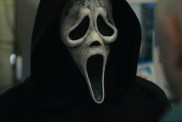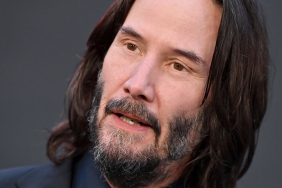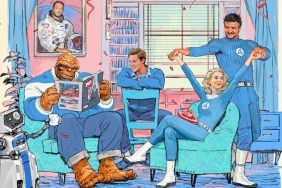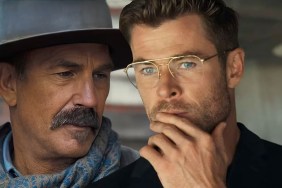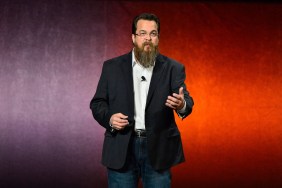Writer/director Nicolas Pesce discusses his horrifying psychodrama The Eyes of My Mother
Writer/director Nicolas Pesce’s nightmarish black and white psychodrama The Eyes of My Mother is a stunner of a horror movie; a stark, masterfully-crafted and admirably portrait of madness bred in the bone. In it, a little Portuguese girl named Francisca lives with her mother – a former surgeon – in a secluded farmhouse. When a giggling home invader does the unthinkable, a perverse chain of events unfolds that does irreversible damage to Francisca’s mind. Years later, as a grown woman, she falls freely into madness and takes many people with her.
We reviewed the film earlier this year (read that glowing notice here) and have been singing the film’s praises ever since. We’re not alone, though it’s a given that a movie like The Eyes of My Mother will divide audiences and critics. And it is doing just that. It’s “that” kind of horror movie. Love it. Hate it. No middle-ground. And this is a good thing, we think.
We had the pleasure of speaking with the talented, passionate Pesce on the eve of the film’s Texas premiere at Austin’s Fantastic Fest this past weekend. It was a fantastic chat that not only dissects the movie itself, but also riffs on the picture’s many influences, both cinematically and culturally.
CS: Can you remember the first time you actually saw it with an audience? How did you feel?
Pesce: We premiered at Sundance and I watched it with an audience for the first time at the first screening. And it was within, I would say, probably the first three minutes, that there were people walking out and it was awesome. And the best part was that the first people to walk out were my producer’s family, who are all surgeons (laughs). So, it was fun to just see kind of the public reception to a movie that we had tried really hard to make no one know what the movie was. And we were not in a horror section at Sundance. So people didn’t quite know what they were getting themselves into. And we kind of sold the movie like a family drama. And seeing how people reacted, particularly the older women, so very soon into the film…well, that was a blast for me.
CS: You mentioned it was not put into the horror section, which is interesting, because the older I get, the less concerned I am about labeling things as genre. And so, I know I felt the same sense of dread that I was looking for in a horror film, watching this, but I’m loathe to even call it a horror film. Do you think it is one?
Pesce: Totally. And I think for me, what I always talked about was when someone says they like the movie Psycho, that doesn’t make them a horror junkie, you know? There are plenty of normal people who don’t like horror movies that love Psycho. And all of Hitchcock’s more horror-centric work…you don’t have to like horror to like that. And I wanted at least for the audience to have the experience of like, not walking into it thinking it was a horror movie, because I think that people think horror movies are something very different than they are, or at least are narrow-minded in their definition of horror. And my movie, I find it way more in the lexicon of movies along the lines of Night of the Hunter and Straight Jacket and Psycho and I didn’t want anyone to think like, The Texas Chain Saw Massacre, which isn’t a bad thing and there definitely is “Texas Chainsaw” in there, but I wanted people to go into the movie thinking that it was a movie about a character and a character study; a movie about a girl, a movie about loneliness, and the fact that there’s all these horrific elements to it. And it’s kind of just like, set dressing, you know? It’s kind of just the costume that’s on the story that makes it a little bit more thrilling, but I could take out all of the violence and it still is just a movie about a girl who lost her mother and is trying to figure out how to deal with that. And I loved any time the audience doesn’t know what they’re about to see, thinks they’re seeing a family drama, and then like, people’s eyes are getting cut out by little girls 15 minutes into the movie and you had no idea that you were getting yourself into this.

CS: You know, you mentioned my all-time favorite movie, which I’ve watched once a month and have for the past 20 years: Night of the Hunter.
Pesce: Yes.
CS: Night of the Hunter, I always felt it was almost like a fairy-tale and I kind of felt that here, too. Do you think there’s a fairy-tale element in your film?
Pesce: Totally. And to me, Night of the Hunter is like, a near perfect Gothic film. And I think to me, there’s an artificial quality to Night of the Hunter because everything’s built on the set and it’s sort of off-putting. And as a result, yes, it feels very much like a fairy-tale, like a fable. And even from the preacher and all the little idiosyncrasies of everyone, it’s very fairy-tale-ish, but super bleak. It’s the bleakest fairy-tale ever, you know? I talk about Night of the Hunter like, endlessly. And it was the movie that, yeah, kind of took these really, really, really dark subject matters, particularly in relation with children, and like their relationship to their parents, and dealt with it in a way that was at times really, really gruesome and horrifying, but at times, just really heartfelt and felt like a family drama. And Night of the Hunter and that great William Castle type of stuff was always more the tone that I found scary. Night of the Hunter is scary because it’s about children who feel vulnerable in their own homes. And seeing that from the child’s perspective is so sad. And then, the violence in it just kind of tightens the tension. But again, yes, at the heart of it is a character piece and a character study about how this family is dealing with trauma, and I was going to kind of use that in Eyes of my Mother as well.
CS: As an aside, you mentioned William Castle and Psycho, and your perspective on the ride depends on when you get on the train, and I always preferred Castle’s Psycho-riff Homicidal to Psycho because I saw it first, you know?
Pesce: (Laughs) Yeah, yes. I like that. You get in on the ride.
CS: Getting back to Night of the Hunter, too, it’s almost like in your movie—and I never thought about this before until now—but it’s like your movie is Night of the Hunter if the child was not rescued by Lilian Gish…
Pesce: 100 percent. That’s exactly it.
CS: Now I’ve read some mostly positive reviews, but the ones that hate it, really hate it…
Pesce: Which is great, which I love.
CS: And someone said something to the effect of that it’s like a “shrill blend of “Texas Chainsaw Massacre” and an Almodovar movie” or something like that.
Pesce: Which they said is a bad thing, and I think that’s awesome.
CS: So do I. I think that should be the quote on the poster…
Pesce: Yeah. (Laughs) Yeah, that’s exactly what I was going for.

CS: The Almodovar feeling obviously comes from some of the use of the music, too…
Pesce: Yeah. I think there’s three sort of palettes to the music that we used in the film. I guess kind of two overarching ones, and it’s like, there is a lot of music that is actually in the world, everything from stuff that’s playing on car radios, a song that’s playing on the inside of the bar, the music that she listens to when she dances. And then the music of the movie. And it was important to us to kind of make them super, super drastically different. And the Amalia Rodrigues music, which is the Portuguese Fado music that she dances to and is the credit music, was something that the actress Kika, she is from Portugal, and right before we started shooting, she had gone home to Portugal to visit her family. And her mom was just like, listening to my Amalia Rodrigues endlessly. And she came back, she was like, “Oh, you know, I remember that the mom had listens to Amalia Rodrigues all the time,” and she played it for me. And I was like, “Oh my god.” And the song that she’s dancing to for her father is literally called “I Will Take Care of You After You Die.”
CS: Oh wow.
Pesce: And I was just like, “Wow, this is so perfect.” And the tone of the music was sad, but weirdly hopeful. And the subject matter was so on point. And I thought that essentially where the father sort of comes in, the music is surrounding and is the sort of thin, ethereal, more like, synthy music and kind of having this really iconic, different, unique sound was arresting in a way that I thought was very interesting. And I think that music in movies is so important, but I also think that we, as filmmakers, get to do stuff with music that the musicians never in a million years thought would ever be done with their music. And I know how Amalia Rodrigues would feel, but I bet you the audience in my movie feels very differently listening to that song than anyone did when she put it out in the ‘60s.
CS: Absolutely. Now, if someone calls this movie a feminist movie or an anti-female movie, where do you stand on that kind of more politicized perspective?
Pesce: I think that it is distinctly not anti-female. To me, the character is a woman and that’s the extent of it. And whatever the audience chooses to take away from it, they can. As like a conscious thought, I was not thinking about making an empowering movie per se. To me, the reason why the character is a woman, is because I wanted to play with the dynamic between mother and daughter, and a daughter who doesn’t know her mother well enough to grow into the woman that she wanted her to be, but still try to do that. And I think that to me, the movie is more about mothers and daughters than it is about feminism, necessarily. And I think that what was important to me was like making a female character that was interesting and complex. And I think that, not that All the Boys Love Mandy Lane is a terrible movie, but I think that most horror females tend to fall into that sort of, the hot blonde, let’s get her in her underwear and running around. And I just think that that’s silly. And I wanted a female character that was more complicated, more interesting and isn’t sort of just the psycho girl who kills everyone who comes in her path.
The Eyes of My Mother will open theatrically, On Demand, on iTunes and on Amazon Video on December 2.
